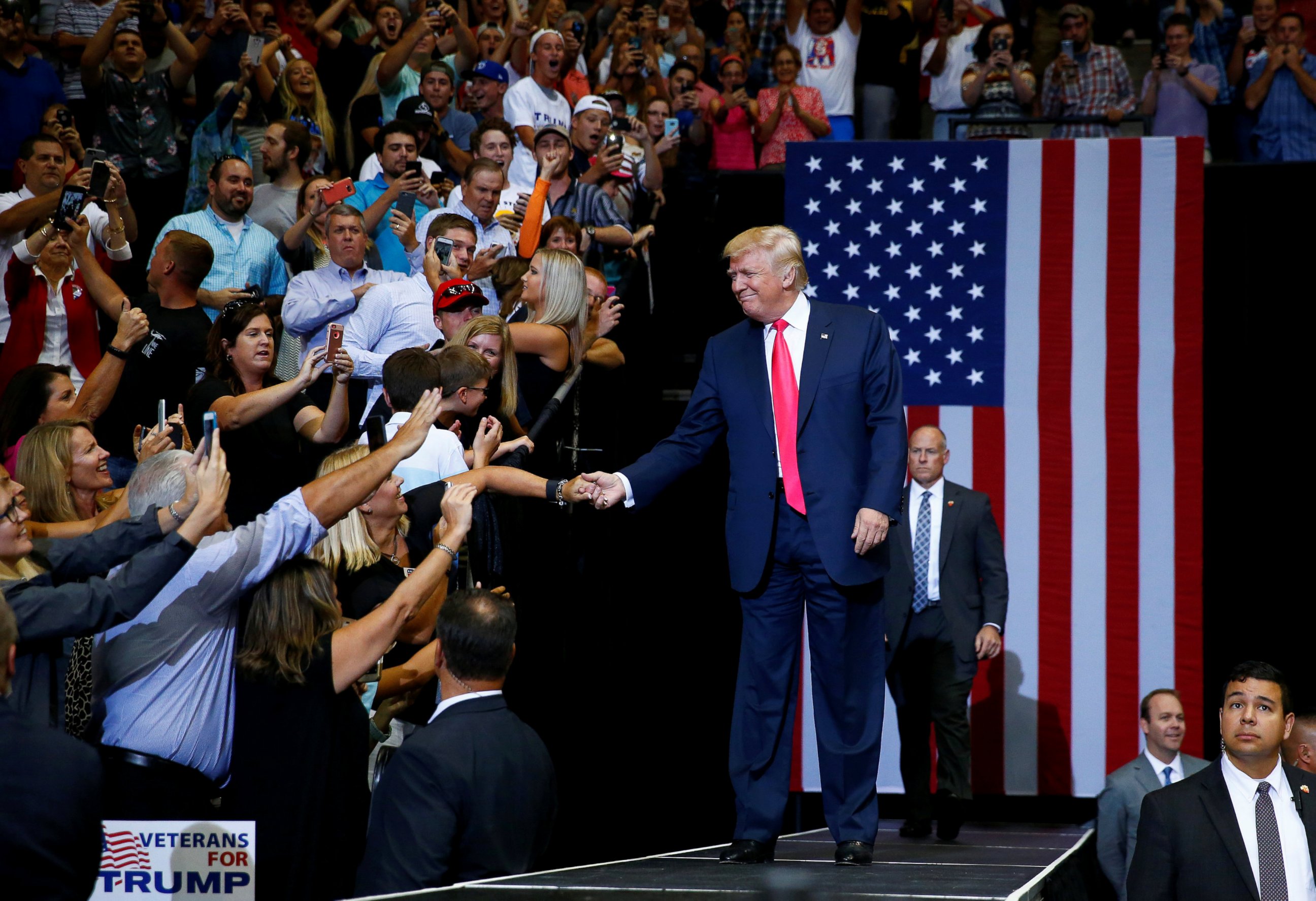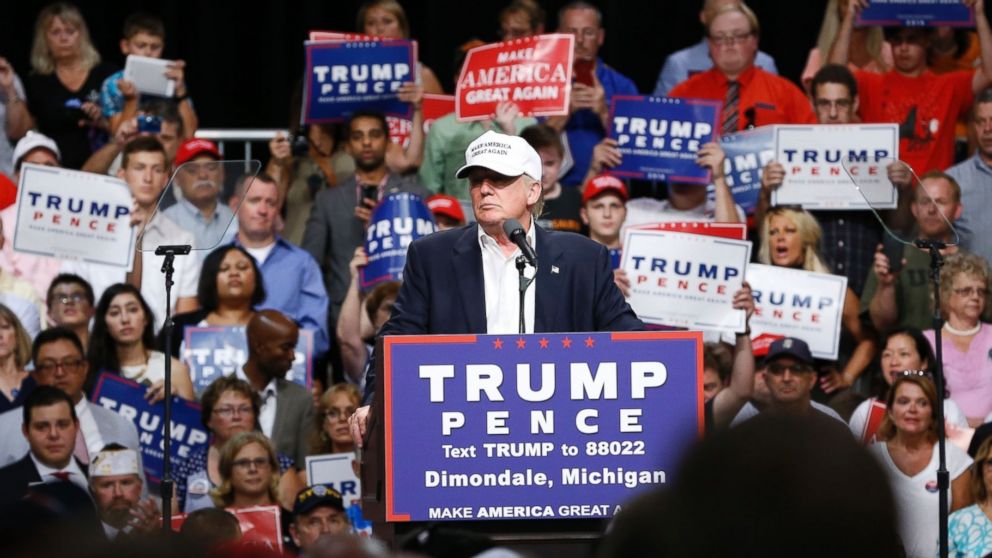Donald Trump Makes Appeal to Black Voters in Speeches but Seemingly Relies on RNC for Outreach
Trump has been making a concerted effort to talk about black voters.
— -- It was still a fresh pitch for Donald Trump. He was addressing a crowd in Dimondale, Michigan, seemingly making an overt appeal to African-American voters.
“You're living in poverty, your schools are no good, you have no jobs, 58 percent of your youth is unemployed,” he said. “What the hell do you have to lose?”
There was only one catch: Dimondale, according to the latest available census data, is a town of 1,234 people. Of those, just nine people are black.
In that respect, that rally was like so many others: Almost all are largely filled with white voters.
But Trump appears to be trying to change that.
He was scheduled to meet this morning with members of the Republican Leadership Initiative (RLI), a program started by the Republican National Committee to engage a diverse group of voters.
Ashley Bell, senior strategist and national director for black engagement for the RNC, says outreach began long before 2016, touting the directors the RNC has placed throughout battleground states. “We’ve knocked on more doors today than we had at this time in 2012,” he told ABC News.
The RLI is one of the RNC’s efforts. Launched in 2015, the program reaches out to diverse groups of activists who may not have been involved in politics before, training them and deploying more than 5,000 fellows to battleground states.
But whereas the RNC has been building an infrastructure dedicated to specifically reaching black voters since 2012, the Trump campaign has not, seeming to rely largely on speeches to white audiences and the efforts of the RNC to reach voters Trump says he can win over.
In Virginia over the weekend, Trump gave a nod to the long-term difficulty the GOP has had in attracting black voters. “I fully recognize that outreach to the African-American community is an area where the Republican Party must do better,” he said.
Trump has been widely criticized for declining invitations to speak to mostly black audiences. HE has declined invitations to speak to the Urban League, the National Association of Black Journalists and the National Association for Hispanic Journalists.

Meanwhile, Reince Priebus, the RNC's chair, has spoken directly to several of these audiences. “The chairman has spoken at NAACP, the chairman has spoken at the Urban League, he's attended almost every backyard barbecue you can think of,” the RNC’s Bell said. “We have a long-running tab at the RNC of outreach over the last four years.”
Omarosa Manigault, the former “Apprentice” contestant, is the Trump campaign’s director of African-American outreach. She says that she’s been in communication with 20 to 30 organizations, though she declined to name which ones.
“When we told all the organizations [that we couldn’t attend], we did express that we were looking for opportunities down the line,” she told ABC News.
She added, “Absolutely he intends to meet with those groups; we will continue to make appeals.”
She and Bell both say that theirs are not separate strategies. Both say they talk to their counterparts each day and that there are events to come, though Manigault again declined to discuss specifics.
“I know that the Democrats monitor our plans closely,” she said, chuckling.
While the RNC has those staffers in battleground states dedicated to black outreach, the Trump campaign only formally has Manigault, though there is an independent organization, the National Diversity Coalition for Trump, that also works with her and the RNC.

While Bell didn’t give any specific dates, he said the RNC was looking at opportunities to engage in events “more traditionally tailored to black audiences.”
That includes activity at historically black colleges and universities, he says, as well as working with black civic organizations.
Manigault bristles at the accusation that Trump has mostly just talked about outreach and hasn’t actually been engaging in it.
“I think that's not a fair assessment,” she said. "You all don't know exactly what we're going to do, and that's the way we like it. We have never played by the regular playbook; we’re recreating the political playbook. You’re going have to watch and wait.”
But there have been conversations about sending Trump directly into black communities and with some of his prominent black supporters, such as adviser and former candidate Dr. Ben Carson, according to a source familiar with their plans.
Trump will begin more trips to urban areas, including one that is in the nascent planning stages for September, the source said. While plans are fluid, this particular idea includes Carson’s leading Trump on a guided tour of the poor neighborhoods where he grew up.
Carson acknowledges that Trump’s fight for a substantial number of black votes could be unattainable, but says that Trump’s desire to reach all voters is genuine.
“The reason that Donald Trump is willing to go into this territory is because he’s not necessarily trying to cultivate votes like your typical politician does,” Carson told ABC News. “He recognizes that there is no way we can have a strong country if we have big pockets of weakness. And he also realizes that in this election cycle he probably won’t get the majority of their votes.”
Trump’s support right now among African-Americans is abysmal. In the latest Pew Research Poll, he had a 2 percent approval rating among African-Americans.
The RNC’s Bell says that going into black communities and speaking with black leaders is a task that, while arduous, is essential. “A lot of that [outreach] is going and talking to people who might not necessarily support you who at least want to make sure that no matter what, the black community has a voice in the White House,” he said.
He concedes that there is more to be done, but says that Trump, at least, speaking directly about African-American issues, as opposed to the 2012 nominee, Mitt Romney, whom Bell also worked for.
“I think that Donald Trump is unique in that he's being directly aggressive, he's being direct about what he thinks and speaking to African-American issues, and he's starting a conversation, a conversation that the Republican nominee hasn't been a part of in a while,” he said
But the substance of that conversation is crucial. In painting an exceptionally grim picture of black unemployment, education and poverty that is not wholly factual, Trump risks alienating black voters even further.
According to Census Bureau data from 2015, 52.9 percent of all black Americans aged 25 or older hold some sort of college or associate degree. A Pew report released in December shows that black adults experienced the largest income increase from 1971 to 2015 and were the only racial group to see a decrease in the percentage of their low-income earners.
Keith Kirkland, a retired van salesman, is a black Trump supporter who went to see his candidate in Akron, Ohio.
“Let’s be clear, all black people ain’t poor, all white people ain't poor, so you don’t want to use a generalization statement,” he began. “But something’s got to change and, hopefully, we’ll get some change that really works.”
He said that Trump is starting to do better with outreach and he hopes to see more. “I think there’s a lot more African-Americans voting for him than you’ll hear about because the persecution you get from liberal blacks if you even think about being Republican or conservative is pretty tremendous,” he said.
Peter James, a registered Democrat also from Akron, mused that Trump’s comments regarding black voters is clear.
“I don’t think his roommate was black in college, let’s put it that way,” James said, laughing. “But I mean, he tries, you know. He made a bold statement. I’m here.”
He then turned away and walked back to his spot amid the other Trump supporters; ready to hear what the nominee had to say.
ABC News' Katherine Faulders contributed to this report.




